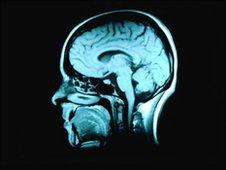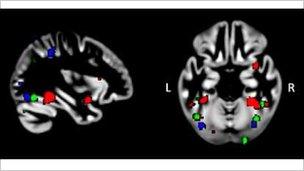Autistic brains "organised differently" say scientists
- Published

Better understanding of autistic brains
People with autism use their brains differently from other people, which may explain why some have extraordinary abilities to remember and draw objects in detail, according to new research.
University of Montreal scientists say in autistic people, the brain areas that deal with visual information are highly developed.
Other brain areas are less active.
The National Autistic Society says the findings significantly increase understanding of the condition.
The research, published in the journal Human Brain Mapping, pulls together 15 years of data on the way the autistic brain works.
Better at visual tasks
It suggests that the brains of autistic people are organised differently from those of other people; the area at the back of the brain, which processes visual information, is more highly developed.
That leaves less brain capacity in areas which deal with decision-making and planning.

Areas where autistic brains are more active
That may be why people with autism can be better than others at carrying out some types of visual tasks.
For example, some are able to draw highly accurate and detailed images from memory.
However, they can find it difficult to interpret things like facial expressions.
The condition varies in severity, with some people functioning well, but others completely unable to take part in normal society.
The researchers believe their findings may lead towards new ways of helping people to live with the condition.
"For example, this may show a means to help people to literacy in a much more natural way than the usual methods of helping autistic people," said Dr Laurent Mottron from the University of Montreal.
"The natural tendency is to think that autism is a form of disorganisation. Here, what we see is that it is a reorganisation of the brain," he said.
Understanding autism
Autism experts regard the research findings as significant.
"This review highlights that autism should not only be seen as a condition with behavioural difficulties, but should also be associated with particular skill," said Dr Christine Ecker from the Institute of Psychiatry at Kings College, London.
"It offers us unique insights into the way people with autism perceive their environment and helps us to understand some of their behaviour."
She said it added to the understanding of autism. "Knowing the strengths and difficulties of someone with autism may help to better understand their needs and help them maximize their potential."
Carol Povey of the National Autistic Society said: "This study is interesting as it begins to demonstrate why people with autism often show a strong single channel for focus and attention.
"Some adults with autism develop their own ways of coping with this experience, some seek out calm and quiet places, whilst others find creative outlets, like art, can help them both process the information as well as give others an insight into how they see the world.
"The more insight we have into the way autism affects sensory processing, the more people with autism, their families and professionals can develop strategies to make daily life easier."
- Published20 March 2011